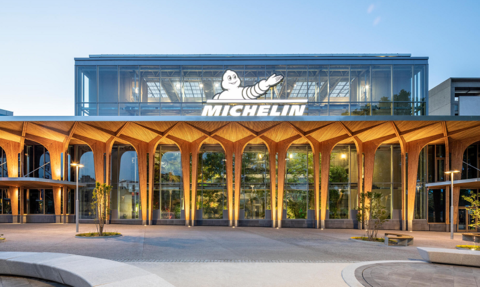Group says faced with €1.2 billion in additional costs of higher raw material prices, shipping crisis
Clermont-Ferrand, France – The Michelin Group has seen a strong growth in sales and operating income in 2021, delivering results close to the 2019 pre-crisis levels.
The French group posted sales of €23.8 billion, up 16.3% compared to the year before and only down 1.4% compared to 2019.
The group’s segment operating income came in at €2.96 billion, more than 57% higher than 2020, and 1.4% lower than 2019, Michelin announced 14 Feb.
Tire volumes were up 11.8% during the year while non-tire sales grew 7.7% year-on-year.
Michelin linked the performance to “very favourable” original equipment/replacement business mix in its automotive segment, and market share gains in 18-inch and larger tires.
Furthermore, the group said its “dynamic price management” in the non-indexed businesses offset cost inflation factors.
According to Michelin, the Covid-19 pandemic continued to have ‘significant adverse impact’ on the group, both in terms of sales lost to temporary restrictions and the ensuing supply chain crisis.
“The robust upturn in global demand, combined with a shortage of cargo space… and the closure of certain ports due to Covid-19, caused extensive slowdowns across the supply chain, tightening raw material supplies and crimping the group’s ability to ship from some of its plants,” Michelin said.
The year was also shaped by labour shortages that impacted the manufacturing operations of both the group and its suppliers.
Michelin linked the difficulties in hiring to both government financial support as well as a structural change, caused by Covid, in labourers' relationship to work.
Furthermore, the strong rebound in global demand in 2021 spurred a sharp run-up in raw material and energy costs, in addition to the steep increase in supply chain costs.
Over the full year, the group said it was faced with €1.2 billion in additional costs, which it offset with “productivity gains, assertive pricing management and a higher value product mix.”
Breaking down the results, Michelin said the passenger car segment witnessed “strong growth in sales and operating income”, led by dynamic pricing management, market share gains in larger tires and a favourable OE/RT mix.
The segment reported a 95.8% year-on-year growth in operating income to €1.6 billion, on 18.8% higher sales of €12 billion during 2021.
The OE segment, Michelin noted, was “severely impacted” by the shortage of auto semiconductors.
The truck and bus tire segment also reported a strong performance, “impelled by robust demand in Europe and North America.” The unit posted a 98.3% increase in operating income to €599 million, on 16% higher sales at €6.2 billion.
Michelin also linked the performance to a “targeted focus on the highest value market segments, responsive pricing management and sustained expansion in fleet management solutions.”
The speciality segment saw sales lifted by 11.4% to €5.5 billion, helped by the construction, agricultural and materials handling tires.
The French group said its speciality businesses – which manufactures two-wheeler, aircraft, farm and construction vehicle tires – was hit harder by labour shortages, supply chain disruptions and cost inflation.
The unit saw operating profit decline 1.8% to €724 million.
“In 2021, Michelin delivered very good results in extremely difficult conditions, while maintaining the priority to protect its employees,” said Florent Menegaux, managing chairman.
“We are confidently looking forward to the continued deployment of our Michelin in Motion strategy,” he added.



